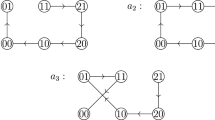Abstract
Real-life behavior in situations where individuals can delegate their decisions to agents and where there are many action alternatives differs systematically from behavior in experiments with narrowly constrained action alternatives. This, however, does not mean that experiments are totally useless.
Access provided by Autonomous University of Puebla. Download chapter PDF
Similar content being viewed by others
Real-life behavior in situations where individuals can delegate their decisions to agents and where there are many action alternatives differs systematically from behavior in experiments with narrowly constrained action alternatives. This, however, does not mean that experiments are totally useless.
The behavioral revolution in economics started in the late 1970s. Experimental evidence showed that real humans are not homines oeconomici: Real humans err systematically and behave impressively fairly. Shockingly, they do so in very simple games such as dictator and ultimatum games. Thus, human behavior cannot be explained by information cost, uncertainty, or complex strategies. It is simply anomalous.
In the 1980s, behavioral economists were convinced that behavioral insights would fundamentally change economics in due time. Today, we know that those economists were wrong. Of course, behavioral economics is well and alive; each year, a huge number of behavioral papers are published. But the effect on standard economics was minor. In the large majority of economic analyses, behavioral insights do not play a role. Why did the behavioral revolution fail?
When I was young, I also believed in the revolution. Actually, it was convincingly shown that anomalies also turn up under competition and in the behavior of experts. But in the late 1980s, I lost half of my belief when I realized that most anomalies do not affect the relative price effect. Thus, they are not a substitute for economics, but they remained an important complement. The second half of my belief faded away only in the 2000s. I learned that reality is not an experiment. In real life, there are two main reasons for individuals to behave as if they were homines oeconomici. This can be explained most easily by looking at dictator and ultimatum games.
First, fairness decreases dramatically if dictators, proposers, and responders get more action alternatives. Examples are experiments in which dictators can either keep their money, transfer it to the recipient, or buy a lottery with negative expectancy value (Felix Oberholzer-Gee and the author) and ultimatum games in which responders can react to unfair offers either by accepting them, rejecting them, or communicating their negative emotions to the proposers (Erte Xiao and Daniel Houser).
Second, fairness breaks down if humans delegate their choice to agents, that is, as soon as they are principals. Although they behave fairly if they act as dictators or proposers, they delegate their decisions to agents who promise to act in the fullest self-interest of the principal, and they require their agents to act in their fullest self-interest. Moreover, recipients and responders are less critical of agents who maximize the selfish utility of their principals than of principals who maximize their own selfish utility. All this is most elegantly shown and discussed by John Hamman, George Loewenstein, and Roberto Weber (2010). Although their experiments are only about delegation and fairness, it is most plausible that delegation also transforms other anomalies. In short, most people like to generously spend their money, but they do not like their agents to generously spend their money, and most people who regularly behave anomalously do not like their agents to behave anomalously.
This research has important implications: Real-life behavior in situations where individuals can delegate their decisions to agents and where there are many action alternatives differs systematically from behavior in experiments with narrowly constrained action alternatives. This, however, does not mean that experiments are useless. They are at least useful for analyzing the striking difference between human behavior in reality and in experiments.
Literature
Hamman, J., Loewenstein, G., & Weber, R. (2010). Self-interest through delegation: An additional rationale for the principal-agent relationship. American Economic Review, 100, 1826–1846.
Author information
Authors and Affiliations
Corresponding author
Editor information
Editors and Affiliations
Rights and permissions
Copyright information
© 2019 Springer Nature Switzerland AG
About this chapter
Cite this chapter
Eichenberger, R. (2019). Reiner Eichenberger Recommends “Self-Interest Through Delegation: An Additional Rationale for the Principal-Agent Relationship” by John Hamman, George Loewenstein, and Roberto Weber. In: Frey, B., Schaltegger, C. (eds) 21st Century Economics. Springer, Cham. https://doi.org/10.1007/978-3-030-17740-9_14
Download citation
DOI: https://doi.org/10.1007/978-3-030-17740-9_14
Published:
Publisher Name: Springer, Cham
Print ISBN: 978-3-030-17739-3
Online ISBN: 978-3-030-17740-9
eBook Packages: Economics and FinanceEconomics and Finance (R0)




